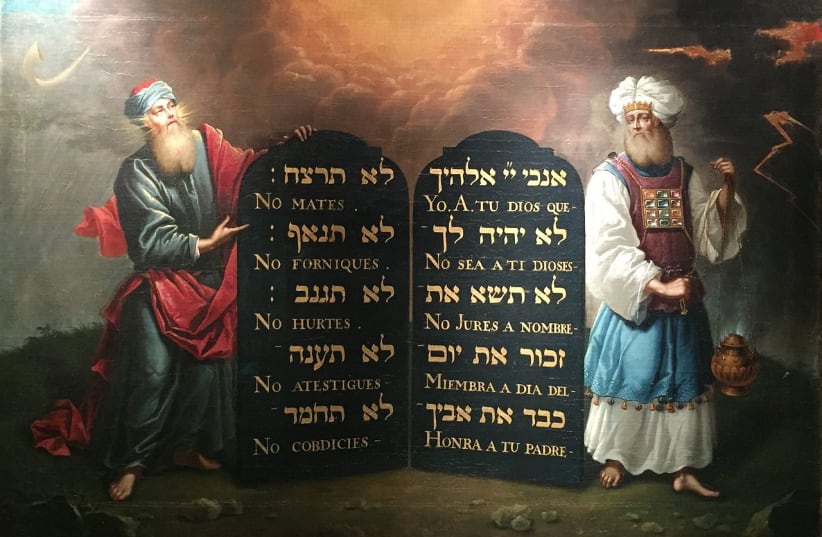Amidst a storm of controversy, media reports suggest that a group of Jewish parents are part of a larger collective that is initiating legal action against a new Louisiana state law. This law mandates the display of the Ten Commandments in all public school classrooms. However, a deeper investigation reveals a more nuanced truth than what is being widely reported.
In a groundbreaking move, Louisiana has become the first state to enforce the display of the Ten Commandments in public school classrooms. This decision is expected to ignite a national debate. Republican Governor Jeff Landry has signed a bill into law, stipulating that the posters with the Biblical verses must be displayed in Louisiana classrooms in a ‘large, easily readable font’ by the beginning of next year. The displays will also feature a four-paragraph’ context statement’, highlighting the Commandments’ historical significance in American public education for nearly three centuries. These displays are mandated to be in place in classrooms by the start of 2025.
Similar bills have been proposed recently in state houses in Texas, Utah and Oklahoma.
In a swift response to this new law, a legal challenge has been mounted on behalf of nine families. Americans United for the Separation of Church and State, the American Civil Liberties Union, and the Freedom from Religion Foundation have united to argue that the law enacted last week infringes upon the First Amendment. The lawsuit contends that the law ‘approves and prescribes one particular version of the Ten Commandments, to which many people do not subscribe’, thereby contravening the Constitution’s prohibitions on establishing an official religion and prohibiting free exercise of religion.
According to the lawsuit, parents send their children to public school “to ensure that they receive a secular, religiously unbiased education and can interact with and get to know peers from a variety of cultural and faith traditions.”
The complainants believe that if the Ten Commandments are displayed in the classroom, “their children will be pressured to observe, venerate, and adopt the state’s preferred religious doctrine and to suppress expression of their own religious backgrounds and views at school.”

An article in Jewish Telegraphic Agency (JTA) reported that three Jewish families participated in the lawsuit.
“Jewish families have played leading roles in religious liberty lawsuits challenging recent legislation by conservative state legislatures,” JTA stated. “Rabbis in a number of states have sued to block restrictions on abortion, for example, arguing that they are based in Christianity and violate the separation of church and state.”
One of the Jewish families noted in the JTA article is Adrian Van Young, who is ethnically Jewish and identifies as Reform. His wife, Reverend Darcy Roake, a Unitarian Universalist, is also one of the complainants. Reform Judaism does not acknowledge Halacha, the formalized system of Torah law.
Another Jewish complainant, Gary Sernovitz, is a New Orleans board member of the Reform Touro Synagogue, and Molly Pulda, a member of the local Jewish community center board. According to the lawsuit, they worry their child may feel pressured to suppress the expression of their “own Jewish background and beliefs, including the fundamental Jewish belief in tolerating and supporting the expression of all faiths.”
None of the Jewish complainants are Torah-observant Jews, nor are they bringing the suit for reasons stemming from Jewish law or Torah values.
This is similar to a case brought last year referred to in the JTA Ten Commandments article in which Americans United for Separation of Church & State brought a lawsuit in St. Louis Circuit Court challenging the state’s “Right to Life of the Unborn Child Act,” claiming it violated the separation of church and state protected in the constitution. The lawsuit was filed on behalf of a dozen Missouri faith leaders, including Christian faith leaders, Unitarian Universalist leaders, and five “rabbis”.
It should be noted that none of the “rabbis” were from the branch of Orthodox Judaism.

The decision by the Jewish faith leaders to take part in the lawsuit was criticized by the Coalition for Jewish Values (CJV), representing more than 2,000 traditional Orthodox rabbis in American public policy. They emphasized that while abortion is permitted by Jewish law in cases in which the mother’s life is in danger, elective abortion violates Jewish law.
It should be noted that the Ten Commandments are written explicitly twice in entirety in the Torah: Exodus 20:1-14 and Deuteronomy 5:6-18. Different religions divide the commandments up differently, though all agree that the total is ten. Some traditions combine the first three into a single commandment based on their shared interest in worship.
While the Ten Commandments are not written in the New Testament, nine of them are referred to. The fourth commandment, which describes the obligation to keep the Sabbath on the seventh day, is not referred to in the New Testament.





